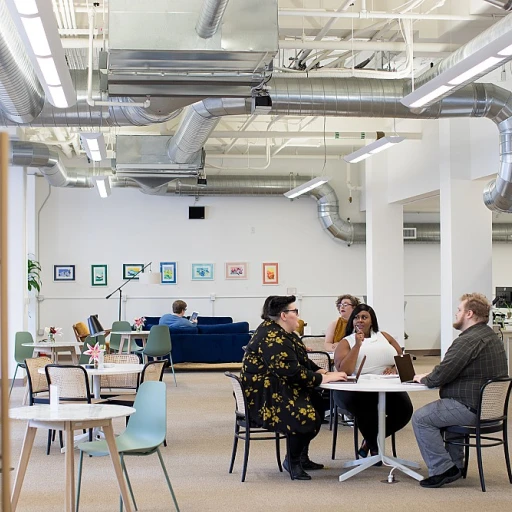
Adapting to Technological Advancements
Keeping Pace with Technological Changes
As the future of work unfolds, technological advancements are transforming traditional workplace dynamics and reshaping the way we define employee success. Organizations that can help employees adapt to these changes will thrive. To do so, they must focus on providing effective resources and support systems that drive employee performance.
For companies, one of the key drivers of success in the digital age is implementing effective performance management strategies. This involves regular performance reviews and comprehensive feedback mechanisms to ensure teams are aware of their goals and progress. By doing so, managers can help employees align with the company's objectives, fostering a culture of contribution and growth.
Additionally, leaders must promote an environment where continuous learning and professional development are prioritized. Offering learning opportunities and creating a robust onboarding guide can significantly impact employee engagement and well-being. This approach not only boosts organization performance but also equips employees with the necessary skills to navigate future work challenges effectively.
Finally, the integration of recognition rewards and the enhancement of engagement performance are essential in keeping team morale high. It's crucial for companies to recognize the efforts of their team members and provide the necessary resources to support both personal and professional growth. By embracing technological advancements, organizations can truly unlock their potential for success in the future of work.
The Rise of Remote and Hybrid Work Models
Embracing New Work Models for Employee Success
The shift towards remote and hybrid work models is fundamentally reshaping the workplace landscape, with far-reaching implications for employee success. Organizations are now tasked with re-evaluating traditional structures to accommodate these changes. Leaders play a crucial role in navigating these transformations by fostering a culture inclusive of remote and hybrid arrangements. By prioritizing employee performance management and actively adapting to these new work configurations, companies can ensure improved engagement and boost overall productivity.
One of the key drivers of success in remote and hybrid work settings is effective communication. Managers must emphasize clarity in goal setting and feedback mechanisms, ensuring that team members remain aligned with organizational objectives. By promoting open communication channels and regular check-ins, leaders can enhance employee engagement and address any work-life integration challenges. This proactive approach helps employees feel supported while balancing personal commitments and professional responsibilities.
To facilitate a seamless transition to remote and hybrid environments, organizations should also focus on providing necessary resources and support. This includes offering robust onboarding guides, employee assistance programs, and access to tools that enable collaboration and innovation. Fostering a supportive environment not only enhances the employee experience but also encourages professional development and growth.
Additionally, recognition and rewards play a pivotal role in maintaining motivation in remote work settings. Managers should strive to create a sense of community and belonging by acknowledging team accomplishments and individual contributions. Such practices boost employee morale, creating a sense of fulfillment and driving long-term engagement performance.
As we look to the future, organizations that prioritize flexibility and adaptability in their work models will be best positioned to cultivate a workforce that thrives in any environment. By understanding the needs of their teams and implementing strategies to meet them, companies will unlock the pathway to sustained employee success.
Skills for the Future: What Employees Need to Thrive
Skills and Attributes for Future Success
The rapidly evolving landscape of work calls for employees to continuously adapt their skillsets to meet new demands. This shift is not just about technical proficiency; employees must cultivate a range of attributes to thrive.- Effective Communication: As organizations increasingly rely on diversified teams, the ability to communicate effectively is more crucial than ever. Employees who excel in conveying ideas and feedback can facilitate better collaboration and avoid misunderstandings.
- Technological Literacy: With technological advancements reshaping industries, employees need to stay abreast of new tools. Companies can support this by providing resources and support for learning opportunities, thus fostering a workforce capable of leveraging the latest innovations for greater performance management.
- Adaptability and Flexibility: Success in the evolving work environment requires employees to be agile. Adaptability enables team members to pivot in response to change, while fostering a company culture that encourages innovation and flexibility.
- Problem-solving Skills: Employees who demonstrate strong problem-solving abilities often stand out as leaders. This skill is essential for driving engagement and achieving organizational goals. A culture that promotes critical thinking and innovation can turn challenges into opportunities for development.
- Emotional Intelligence: Recognizing and managing emotions—both their own and those of others—equips employees to handle complex interpersonal dynamics. High emotional intelligence contributes to a positive employee experience and strengthens team engagement.
The Importance of Continuous Learning and Development
Continuous Growth and Professional Development
In today's rapidly evolving workplace, fostering a culture of continuous learning and development is essential for both employees and organizations. With technologies advancing at an unprecedented pace and remote work models becoming the norm, it is crucial for employees to adapt and thrive in this dynamic environment. To support this, companies should focus on providing ample learning opportunities that cater to the diverse needs of their teams. This includes offering training programs, online courses, and workshops that help employees enhance their skills and align with the company's long-term goals. To ensure the successful implementation of such initiatives, leaders and managers must prioritize feedback and performance reviews, creating an open channel for effective communication within teams. Moreover, recognizing and rewarding employee engagement and performance can significantly boost motivation and drive. This not only strengthens the organization’s culture but also enhances the overall employee experience, contributing to higher success rates and better performance management. For organizations aiming to cultivate a success-centered environment, employee growth should be considered a primary driver. By equipping team members with the necessary resources and support, including onboarding guides and employee assistance programs, companies can help employees achieve optimal work life balance, thereby enhancing their professional and personal lives. Ultimately, the pursuit of continuous development not only fuels employee success but also empowers the entire organization to innovate and stay competitive in the future of work.Fostering a Culture of Innovation and Flexibility
Creating a Culture of Innovation and Responsibility
In an ever-changing work environment, organizational leaders must shift their focus towards fostering a culture of innovation and flexibility. This approach not only drives employee engagement but serves as a fundamental basis for achieving employee success. A thriving company is characterized by its ability to quickly adapt to changes, and employees play a crucial role in this dynamic. Encouraging a sense of responsibility and innovative thinking among team members supports the overall success of the organization.Nurturing Innovation Through Leadership and Engagement
Managers and leaders are pivotal in developing a culture where innovative ideas can flourish. They should actively work to provide necessary resources and support, enabling employees to experiment and learn from both successes and failures. Effective communication and feedback further help teams refine their strategies and contribute to professional development. To ensure employee success, leaders should establish clear goals and engage team members in their pursuit. Regular performance reviews and constructive criticism ensure that individuals remain aligned with the company's values, promoting an environment where innovation is not just encouraged, but expected.Tailoring Resources for Success and Development
Organizations should invest in resources that support professional development and help employees grow within their roles. Offering learning opportunities, such as workshops and mentorship programs, equips employees with the skills needed to contribute effectively to the company’s objectives. Furthermore, recognition and rewards systems play a crucial role in promoting employee engagement. Recognizing employees for their contributions not only boosts morale but reinforces an innovative culture essential for sustained success. To create an environment that promotes innovation and adaptability, management must place emphasis on fostering a supportive atmosphere that values team input. By doing so, organizations will harness the collective strength of their teams, driving the company towards greater achievements.Balancing Work-Life Integration for Optimal Performance
Achieving the Right Balance for Enhanced Performance
The future of work demands a delicate balance between professional obligations and personal life, ensuring optimal performance without burning out. This balancing act is paramount in driving employee success and engagement. With the rise of remote and hybrid work models, organizations must create a conducive environment that favors both work and life balance.
Achieving this balance calls for effective communication and feedback mechanisms. Managers and team leaders play a crucial role in facilitating this as they help employees navigate their objectives while maintaining a healthy work-life integration. Regular performance reviews and constructive feedback sessions provide employees with clarity on their goals and the resources or support needed to achieve them.
In fostering a culture that values flexibility and innovation, organizations should focus on recognizing and rewarding team members. Recognition rewards not only boost morale but also serve as pivotal drivers for employee engagement and sustained performance. Performance management strategies that align personal aspirations with organizational objectives can significantly enhance the employee experience.
Moreover, professional development opportunities should be widely available, with companies tailoring programs that support both personal and professional growth. Continuous learning initiatives, such as onboarding guides and learning opportunities, empower employees to cultivate skills required for their success.
Ultimately, the aim is to create a success center where employees feel supported and valued. Leaders are tasked with the responsibility to provide such environments, ensuring that their teams feel motivated and engaged. By prioritizing work-life integration, organizations set the stage for a thriving, productive workforce ready to excel in the dynamic landscape of the future.













